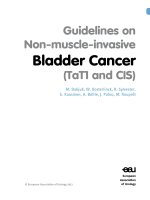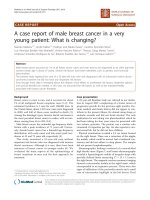Metastatic non-muscle invasive bladder cancer with meningeal carcinomatosis: Case report of an unexpected response
Bạn đang xem bản rút gọn của tài liệu. Xem và tải ngay bản đầy đủ của tài liệu tại đây (1.48 MB, 4 trang )
Teyssonneau et al. BMC Cancer (2017) 17:323
DOI 10.1186/s12885-017-3309-2
CASE REPORT
Open Access
Metastatic non-muscle invasive bladder
cancer with meningeal carcinomatosis:
case report of an unexpected response
Diego Teyssonneau1, Amaury Daste1,2*, Vincent Dousset2,3, Jean-Luc Hoepffner4, Alain Ravaud1,2
and Marine Gross-Goupil1
Abstract
Background: Non-muscle invasive bladder cancer (NMIBC) is usually treated with local therapy including transurethral
resection of the bladder tumor and intravesical therapy depending on the stage of the tumor. NMIBC is a rarely a
metastatic diseases with lymph node invasion in less of 10%. In the other hand meningeal carcinomatosis is a rare
location for metastases with extremely poor outcomes. We described a case report of a patient presenting a metastatic
disease to bones and meninges, several years after the treatment of NMIBC, which had been in complete response
(CR) for 4 years after chemotherapy treatment.
Case presentation: A 63-years old men was treated by TURBT in 2008 for a high grade NMIBC, pT1b. Three years later
he presented an acute binocular diplopy with right trochlear nerve paralysis, and labial hypoesthesia. Brain scan and
MRI were performed finding a clivus infiltration and a pachymeningitis. A vertebral biopsy was performed finding an
invasive carcinoma, CK7+/CK20+, TTF1-, PSA-, Thyroglobulin- and GATA3+. The metastatic event was in relation to the
high grade NMIBC treated 3 years previously. Palliative chemotherapy was started with cisplatin gemcitabine. After
6 cycles and to date, 4 years later, the patient is therefore considered in complete response.
Conclusion: Metastasis in non-muscle invasive urothelial carcinoma is rare. Meningeal carcinomatosis outcome is poor,
usually appearing in widely metastatic and progressive cancers but also because most systemic agents fail to pass the
blood-brain barrier and penetrate into the cerebrospinal fluid. We described an unexpected response with complete
response after chemotherapy for meningeal carcinomatosis of non muscle invasive urothelial carcinoma.
Keywords: Non-muscle invasive bladder cancer, Meningeal carcinomatosis, Complete response, Chemotherapy
Background
Bladder cancers are the eighth most common cancer in
Europe, with an incidence of 19.5/100000/year and a
mortality rate of 7.9/100000/year. The most frequent
histological subtype is urothelial carcinoma. Seventy
percent of the cases are non-muscle invasive bladder
cancer (NMIBC) [1].
Usually the diagnosis and treatment of NMIBC consists
in a transurethral resection of the bladder tumor (TURBT).
A second TURBT is recommended and intravesical therapy
* Correspondence:
1
Department of Medical Oncology, Saint-André hospital, University
Hospital-CHU Bordeaux, 1 Rue Jean Burguet, 33000 Bordeaux, France
2
University of Bordeaux, Bordeaux, France
Full list of author information is available at the end of the article
may be carried out after complete resection depending on
the stage of the tumour.
Unfortunately, despite treatment, 31 to 78% of patients
experience a tumor recurrence within 5 years. In 5 to
20% of the cases it progresses to a muscle-invasive
bladder cancer [2].
A recent study showed that 10% of the NMIBC patients
who underwent a radical cystectomy had a lymph node
invasion (9% for T1, 12% for Tis, 4.5% for Ta) [3].
Otherwise meningeal carcinomatosis (MC) is a rare
location for metastases from a solid tumor and is correlated with an extremely poor outcome, with a median
survival of 4 to 6 weeks [4].
We report here on an original case of a patient
presenting a metastatic disease to bones and meninges,
© The Author(s). 2017 Open Access This article is distributed under the terms of the Creative Commons Attribution 4.0
International License ( which permits unrestricted use, distribution, and
reproduction in any medium, provided you give appropriate credit to the original author(s) and the source, provide a link to
the Creative Commons license, and indicate if changes were made. The Creative Commons Public Domain Dedication waiver
( applies to the data made available in this article, unless otherwise stated.
Teyssonneau et al. BMC Cancer (2017) 17:323
several years after the treatment of NMIBC, which had
been in partial response (PR) with prolonged diseasefree-survival for 4 years after a single line of chemotherapy consisting of Cisplatine and Gemcitabine.
Case presentation
In July 2011, a 63-year old male patient complained of
an acute binocular diplopy with right trochlear nerve
paralysis, and labial hypoesthesia.
Previous medical history included a high grade
NMIBC, pT1b, treated in 2008 by TURBT and intravesical BCG therapeutic therapy. The patient presented no
signs of local recurrence. He had ceased smoking after
60 Pack-Years.
Brain scan and MRI were performed finding a clivus
infiltration and a pachymeningitis.
There were no infectious or autoimmune diseases,
three spinal taps showed no bacteria, abnormal cells, or
hyperproteinorachy, and the tumor markers (AFP, PSA,
NSE, ACE, CA19.9, thyroglobulin, calcitonin) were
negative.
The patient underwent a whole body CT-scan revealing blastic lesions mostly in the spinal and femoral
regions. A PET-scan was then performed, showing a
diffuse bone marrow hypermetabolism but no primary
tumor site. Additional work-up included a cystoscopy, a
prostate echography, a thyroid echography and a gastrointestinal endoscopy. All were negative.
Finally, a vertebral biopsy was performed finding an invasive carcinoma, CK7+/CK20+, TTF1-, PSA-, Thyroglobulinand GATA3 + .
Based on the patient’s medical history and the immunohistochemical analogy we hypothesized that the
metastatic event was in relation to the high grade
NMIBC treated 3 years previously.
Palliative chemotherapy was then initiated with 6
planned cycles combining gemcitabine-cisplatine, with a
mid-term assessment.
Chemotherapy was safely administered with with no
side effects other than Grade 1 nausea and diarrhea for
4 days at each cycle. Due to the cumulative toxicity of
Page 2 of 4
the Gemcitabine, the last injection was not given
because of a Grade 2 thrombocytopenia.
After 3 cycles, the binocular diplopy disappeared, the
brain MRI found a decrease in the meningeal rising, and
the PET-scan reported a decrease in bone metabolism
but continued persistence of the heterogeneity of clivus
and bones.
After 6 cycles and to date, 4 years after the last administration of chemotherapy, there is no further PET-FDG
metabolism in brain or bones, but persistence of heterogeneity (Figs. 1, 2 and 3) on MRI. The patient is therefore
considered to be in complete response (CR).
Clinically, he has no other neurological symptom but a
restricted labial hypoesthesia.
The interest of complementary cerebral radiotherapy
was challenged in a multidisciplinary meeting. However,
considering the complete response and the expected
long term toxicity of a whole brain irradiation, the
indication was not retained.
The patient still has his bladder. The last cystoscopy
was performed in September 2015 and was normal.
Discussion and conclusion
This undifferentiated carcinoma can be linked to the
NMBIC. However, CK7 and CK20 positivity is more
likely to be correlated with urothelial, pancreatic, ovarian
and cholangiocarcinoma, and GATA 3 is correlated with
breast, cutaneous and urothelial cancers [5].
Metastasis in non-muscle invasive urothelial carcinoma is rare, and in this case the patient’s NMIBC has
never recurred. Matthew and al. [6] reviewed cases of
more than 1000 patients treated by radical cystectomy
for bladder cancer, regardless of the stage, and identified
9 patients with superficial urothelial carcinoma and
distant metastatic disease (including 3 patients with
stage pTa disease).
The location of the metastases is atypical in this case
since urothelial carcinoma is more likely to metastasize
in the liver (47%), lung (45%) or bones (32%) but rarely
in the meninges (5%) [7, 8].
Fig. 1 PET-scan before (a) and after (b) treatment showing a decrease in bone hypermetabolism
Teyssonneau et al. BMC Cancer (2017) 17:323
Page 3 of 4
Fig. 2 Brain MRI before (a, b) and after (c, d) treatment, showing absence of the pachymeningitis and a refilling of the clivus
Visceral metastases are correlated with a poor outcome in bladder cancers. Overall survival (OS) decreases
from 18 months in inoperable locally advanced bladder
cancers, to 8.5 months in the case of visceral metastases,
and even to 38 days in the case of MC [9, 10].
MC outcome is poor, usually appearing in widely metastatic and progressive cancers (70%) but also because most
systemic agents fail to pass the blood-brain barrier and
penetrate into the cerebrospinal fluid [11].
The first-line therapy for metastatic bladder cancer is
based on a doublet of chemotherapy with platinum.
Historically it was MVAC (methotrexate, vinblastine,
doxorubicine, cisplatine) with an overall response rate
(ORR) of 72% and a median survival lasting more than a
year [12] However, treatment with MVAC is associated
with substantial toxicity. There was 82% Grade 3-4
neutropenia, and 25% nadir sepsis, as well as significant
mucositis (13% Grade 3 or 4).
A new trial, testing Gemcitabine-Cisplatine (GC)
versus MVAC, was therefore designed showing a similar
survival advantage: OS was 13.8 months vs 14.8 months,
and ORR was 49% vs 46% in the GC and MVAC arm
respectively. Less toxicity, especially regarding neutropenia (Grade 3-4: 82 vs 71%) and mucositis (Grade 3-4:
22% vs 1%), was noted in the GC arm [13].
The Gemcitabine-Cisplatine combination is therefore
now considered to be the standard care.
We report a PR with prolonged disease-free-survival,
which is spectacular given the location of metastases,
especially the meningeal carcinomatosis. Von der Maase
and al. [13] showed that we could expect 12% of
complete response in locally advanced or metastatic
urothelial carcinoma with Gemcitabine-Cisplatine treatment, not taking into account the location of the metastases, and the median time to relapse after a CR is unknown
but probably far less than 4 years.
In summary, in this case we observed an unexpected
response, lasting in time, after only 6 cycles of
Gemcitabine-Cisplatine, in a rare metastatic non-muscle
invasive urothelial carcinoma, with a poor outcome
given the location of the metastases and particularly with
a meningeal carcinomatosis.
Fig. 3 CT-scan before (a) and after (b) treatment showing a persistence of bone infiltration
Teyssonneau et al. BMC Cancer (2017) 17:323
Page 4 of 4
Abbreviations
CR: Complete response; GC: Gemcitabine-Cisplatine; MC: Meningeal
carcinomatosis; MRI: Magnetic resonance imaging; MVAC: Methotrexate,
vinblastine, doxorubicine, cisplatine; NMIBC: Non-muscle invasive bladder
cancer; ORR: Overall response rate; OS: Overall survival; PET-FDG: Positron
Emission Tomography 18-Fluoro-deoxyglucose; TURBT: Transurethral
resection of the bladder tumor
8.
Acknowledgements
Not applicable.
11.
9.
10.
12.
Funding
No funding was received for this study.
13.
Availability of data and materials
All data generated or analysed during this study are included in this
published article.
Babaian RJ, Johnson DE, Llamas L, Ayala AG. Metastases from transitional
cell carcinoma of urinary bladder. Urology. 1980;16:142–4.
Jessen C, Agerbaek M, Von Der Maase H. Predictive factors for response and
prognostic factors for long-term survival in consecutive, single institution
patients with locally advanced and/or metastatic transitional cell carcinoma
following cisplatin-based chemotherapy. Acta Oncol. 2009;48:411–7.
Uncu D, Arpaci F, Beyzadeoglu M, et al. Meningeal carcinomatosis: an extremely
rare involvement of urinary bladder carcinoma. Tumori. 2010;96:352–4.
Leal T, Chang JE, Mehta M, Robins HI. Leptomeningeal Metastasis:
challenges in diagnosis and treatment. Curr Cancer Ther Rev. 2011;7:319–27.
Sternberg CN, Yagoda A, Scher HI, et al. Methotrexate, vinblastine, doxorubicin,
and cisplatin for advanced transitional cell carcinoma of the urothelium.
Efficacy and patterns of response and relapse. Cancer. 1989;64:2448–58.
von der Maase H, Hansen SW, Roberts JT, et al. Gemcitabine and cisplatin
versus methotrexate, vinblastine, doxorubicin, and cisplatin in advanced or
metastatic bladder cancer: results of a large, randomized, multinational,
multicenter, phase III study. J Clin Oncol. 2000;18:3068–77.
Authors’ contributions
MGG, JLH, and AR were the treating physician of the patient. DT and AD
designed the study and drafted the manuscript. VD was the radiologic
expert. All authors read and approved the final manuscript.
Competing interests
Gross-goupil have consulting fees or honorarium from Pfizer, Novartis and
MSD, Ravaud is member of global, European and/or French advisory board
in RCC for Pfizer, Novartis, BMS, received institional grant support by Pfizer
and Novartis and housing and travelling support for meeting by Pfizer,
Novartis and BMS. The others authors declare that they have no conflict of
interest.
Consent for publication
Consent to publish this case report was obtained from the patient. A copy of
the consent and all data and materials are available for review by the Editorin-Chief of this journal.
Ethics approval and consent to participate
Not applicable.
Publisher’s Note
Springer Nature remains neutral with regard to jurisdictional claims in
published maps and institutional affiliations.
Author details
1
Department of Medical Oncology, Saint-André hospital, University
Hospital-CHU Bordeaux, 1 Rue Jean Burguet, 33000 Bordeaux, France.
2
University of Bordeaux, Bordeaux, France. 3Neuroradiology Department,
Bordeaux University Hospital, CHU Bordeaux, 33000 Bordeaux, France.
4
Department of Urology, Clinique Saint-Augustin, Bordeaux, France.
Received: 26 July 2016 Accepted: 1 May 2017
References
1. Bellmunt J, Orsola A, Maldonado X, Kataja V, ESMO Guidelines Working
Group. Bladder cancer: ESMO practice guidelines for diagnosis, treatment
and follow-up. Ann Oncol. 2010;21(Suppl 5):v134–6.
2. Clark PE, Agarwal N, Biagioli MC, et al. Bladder cancer. J Natl Compr Cancer
Netw. 2013;11:446–75.
3. Bruins HM, Skinner EC, Dorin RP, et al. Incidence and location of lymph
node metastases in patients undergoing radical cystectomy for clinical nonmuscle invasive bladder cancer: results from a prospective lymph node
mapping study. Urol Oncol. 2014;32:24. e13-19
4. Chamberlain MC. Neoplastic meningitis. Neurologist. 2006;12:179–87.
5. Miettinen M, Cue PAM, Sarlomo-Rikala M, et al. GATA 3 – a multispecific but
potentially useful marker in surgical pathology – a systematic analysis of
2500 epithelial and non-epithelial tumors. Am J Surg Pathol. 2014;38:13–22.
6. Matthews PN, Madden M, Bidgood KA, Fisher C. The clinicopathological features
of metastatic superficial papillary bladder cancer. J Urol. 1984;132:904–6.
7. Lebret T, Méjean A. Rare locations of metastases from urothelial carcinoma.
Prog En Urol. 2008;18(Suppl 7):S289–97.
Submit your next manuscript to BioMed Central
and we will help you at every step:
• We accept pre-submission inquiries
• Our selector tool helps you to find the most relevant journal
• We provide round the clock customer support
• Convenient online submission
• Thorough peer review
• Inclusion in PubMed and all major indexing services
• Maximum visibility for your research
Submit your manuscript at
www.biomedcentral.com/submit









